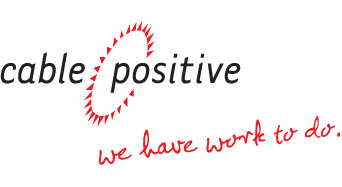By Steve Villano
If President Obama is looking for an effective example of how corporations or private industry should behave in this brand new era of social responsibility, he needs to use his Blackberry and click on Cable Positive’s website. For the past 17 years, Cable Positive has been practicing the kind of civic virtue that the new President is preaching.
Since its creation in 1992 by three cable industry activists, Cable Positive has recognized what President Obama called in his Inaugural Address, “the price and promise of citizenship.” Cable’s leaders and the entire industry were never required by law to use our vast resources for public service and the public good—we did it because it was the right thing to do.
In the poetry of his Inaugural speech, President Obama paraphrased the great religious philosopher Teihard de Chardin—whom Mario Cuomo frequently quoted—that the spirit of service was personified by a “willingness to find meaning in something greater than themselves.” That’s precisely the self-less spirit that launched Cable Positive when friends, family members and colleagues of cable industry employees were, in large numbers, dying of AIDS, in the days before the discovery of anti-retroviral drugs.
Industry activists like Jeff Bernstein & Lifetime’s Meredith Wagner, and leaders such as Showtime’s Matt Blank, Reed’s Bill McGorry, Rainbow Media’s Josh Sapan, & Time Warner’s Jeff Bewkes felt compelled by compassion and common sense to use the vast creative and communications power of the cable television industry to spread messages of HIV/AIDS awareness, education and prevention—to help save the lives of people they loved, and with whom they worked. There was no gain in it for them or their companies. They just wanted to do what their hearts & minds told them they had a fundamental human responsibility to do.
These cable leaders, this industry, ushered in what the 44th President of the United States called “a new era of responsibility,” long before Barack Obama was in public office. This industry pioneered corporate social responsibility—on behalf of a huge, worldwide industry with enormous power and reach—specifically, in the fight against HIV/AIDS.
We recognized long ago—and we continue to adhere to these truths—that, as President Obama said, “we have duties to ourselves, our nation and the world, duties that we do not grudgingly accept but rather seize gladly, firm in the knowledge that there is nothing so satisfying to the spirit, so defining of our character than giving our all to a difficult task.”
Our work, as an industry and as individuals, personifies this ethic of public service.
Thursday, January 22, 2009
Cable Positive: A Model Program for the Public Good
Posted by
Cable Positive
at
6:55 AM
0
comments
![]()
Wednesday, January 7, 2009
The Preacher, the President-Elect and AIDS
By Steve Villano
I was for the election of Barack Obama as President almost two years before his inauguration as President of the
I attended fund-raisers for Obama, contributed money on-line, did telephone canvassing for his election, and contacting friends in key states around the nation urging them to work hard for his election. I was elated over his sweeping victory, as a victory of common sense, compassion, and intelligent problem-solving, over years of hatred, division, and stupidly ignoring reality. As someone who has worked hard to fight HIV/AIDS, and the stigma surrounding the disease, over the past several decades, I was optimistic that, in Obama, we would have a leader who understood the magnitude of the crisis, particularly in communities of color.
The vote in favor of Proposition 8 in California—banning same sex marriages which the state’s highest court said were legal—was particularly strong in Black and Latino communities across California. Friends who logged many hours going door-to-door both for Obama and to defeat Proposition 8, talked of feeling torn apart—the more votes they pulled out for Obama in communities of color, the more votes they were delivering to the opponents of equal marriage rights for all. Stigma against people with AIDS in communities of color—which we know prevents infected individuals from getting treatment and care-- was only trumped by discrimination against gays & lesbians.
Only Obama had the stature and the credibility, we reasoned, to go back into those communities of color—which gave him overwhelming support—and teach them that stigma, as Nelson Mandela said, kills people. And we were confident he would.
Then, along came Rick Warren, whose long record of vile, gay-bashing statements wasn’t bad enough to disqualify him for a speaking role at the most inclusive inauguration in generations. In defending the choice of
If they did, they would have discovered that
That kind of work on AIDS is nothing to be pointed to with pride by Obama’s top aides on “Meet the Press,” or anywhere else. It’s a disgrace.
Let Rick Warren attend the inauguration, along with clergy from every faith. But, let him listen quietly while Bishop Desmond Tutu delivers an invocation message of inclusion and compassion in which all the world can believe.
Posted by
Cable Positive
at
2:24 PM
0
comments
![]()

